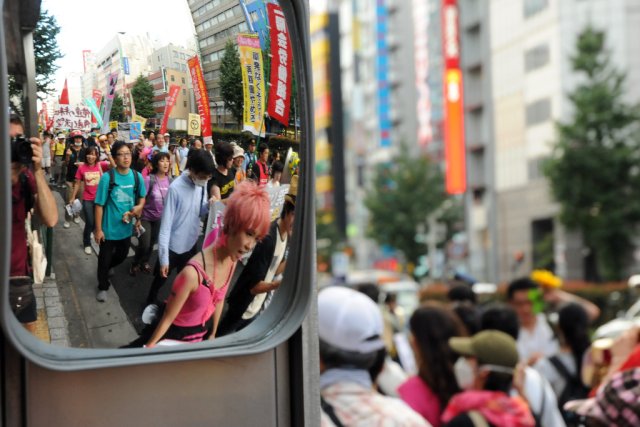
Tens of thousands filled the square as the echoes of the speaker at the podium boomed through huge speakers. Some came in anger, others in grief, but all agreed: it was time for a change. Many carried banners, others carried drums; some had taken their children out of school to attend.
No, this wasn't Tahrir Square; it was Tokyo, Japan, on a chilly Monday last September.
Ever since the devastating earthquake and tsunami that crippled the Fukushima Daiichi nuclear power station, Japanese civil society has become less, well, polite.
The compounded disaster has energised segments of Japanese civil society to be more proactive, innovative, vocal and even contentious about everything from personal safety to nuclear power.
These changes in can be seen in four main areas: mass protests, local and national referenda and petitions, renaissance of citizen science, and public uproar.
Until recently, Japan's large-scale protests were mostly in the past. Activists speak nostalgically of the huge rallies against the US-Japan Security Treaty in the 1960s.
And back in the mid-1990s, large numbers of residents marched in protest of the rape of an Okinawan schoolgirl at the hands of US marines.
But over the past year, civil dissent has become a routine feature of Japanese society. Mass, anti-nuclear protests have been held country-wide.
The two-day Nuclear Free World conference was held in Yokohama in mid-January, drawing more than 12,000 participants. There have been semi-regular Tokyo rallies, which draw upward of 40,000 participants, with organisers calling for continued direct action.
Protests have also included smaller-scale events, such as the activists who set up and occupied tents last year on the properties of the civil servants who regulate and promote nuclear power in Tokyo's Kasumigaseki district. They have remained ever since despite threats of eviction.
More than 5 million citizens have signed a new petition against nuclear power in Japan, asking the government to shut down all atomic plants permanently.
An Osaka-based group has filed for a referendum on nuclear power after collecting the requisite signatures ― more than 2% of voters in the city.
Other groups in Tokyo and in Shizuoka are seeking the approval of local assemblies to hold nuclear referenda. Citizens' referenda have no binding legal power in Japan, but past referenda on nuclear power have still had a lasting effect.
In Maki village in the mid-1990s, for example, a referendum resulted in wins for those who sought to end siting processes in their communities.
Along with local-level referenda on nuclear power, some groups have pushed for an advisory-style national referendum on nuclear power based on a similar process held in Sweden in the 1980s.
Such a national referendum would be a first. It could push the government to consider new ways in which citizens can be more fully integrated into decision-making procedures on nuclear power.
Many observers noticed the radiation data after the accident at Fukushima were released slowly and with little explanation of the consequences. Others took the complaint further, claiming the government and public utilities deliberately sought to reduce public alarm by withholding critical information.
Deciding to take matters into their own hands, a wide swath of citizens across Japan joined together for a creative-commons-based project known as SafeCast.
SafeCast encourages citizens to use their own radiation-measuring devices to measure levels of radioactivity and post that data directly to the forum. Personal-radiation devices can be created with modified smart phones and personal computers along with standard, off-the-shelf radiation detectors.
This crowd-sourcing on Japan's radiation levels has resulted in more than 1 million pieces of data published in an open forum that provides a dynamic map of radiation levels throughout the country.
This form of democratisation of data collection and analysis provides a new channel for citizens to move beyond the opaque nuclear industry institutions of the past.
Many scholars have argued that citizens in Japan privatise protest or seek to avoid direct conflict with authorities. But the vast disaster at Fukushima has brought out open backlash against bureaucrats in very public forums.
Many citizens feel that the government has failed to demonstrate enough flexibility, openness and transparency in its response to public concerns. Residents in Fukushima and elsewhere have vocally expressed their outrage with authorities at heated public exchanges and town-hall-style meetings ― events often taped by citizens and posted to YouTube.
Hugh Gusterson, in his book People of the Bomb: Portraits of America's Nuclear Complex, deemed interactions in which scientists and other authorities go through the motions of public forums, but leave little room for questioning from citizens on scientific and technical matters, "rituals of assent".
Given that past meetings between Japanese state representatives and civil society on issues of nuclear power often resembled rituals of assent as a matter of course, this public outcry is a sea change in Japan's style of interaction.
These new methods of state-civil society interaction in Japan illuminate not only an anger about the way government and private-sector authorities have handled the nuclear disaster, but also shed light on a broader dissatisfaction with a continued exclusion of civil society from the policy arena over the past decades.
Through mass protests, petitions, citizen science, and direct ― and often uncomfortable ― confrontation with the state, Japanese citizens are pushing for a new, more vocal role in policy making.
[Abridged from Bulletin of Atomic Scientists. Read more anti-nuclear coverage.]
